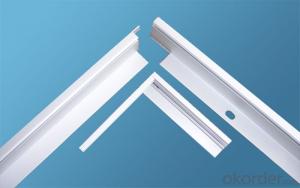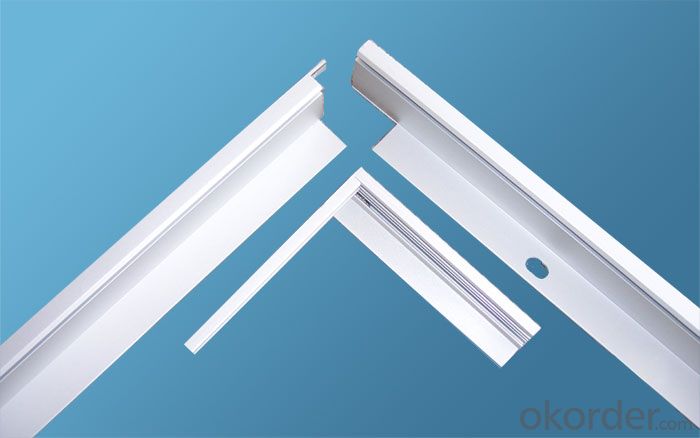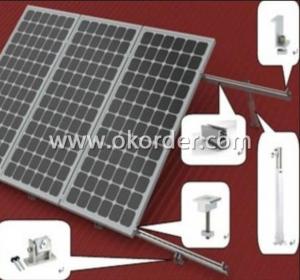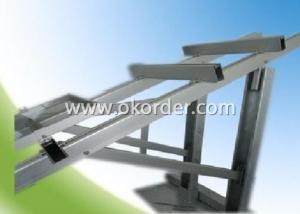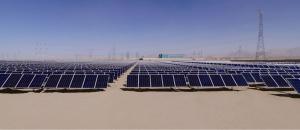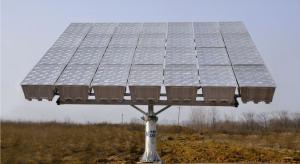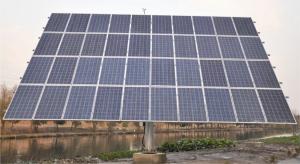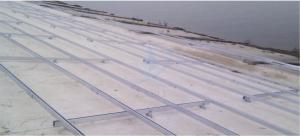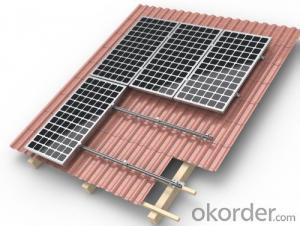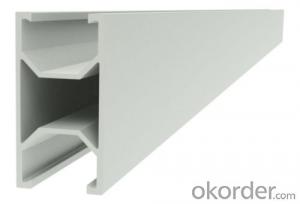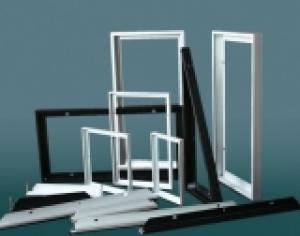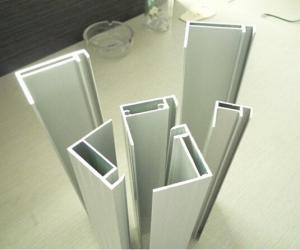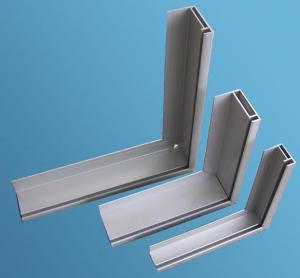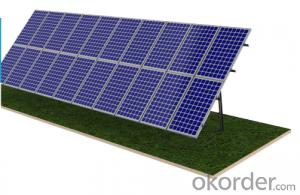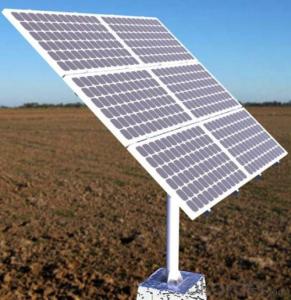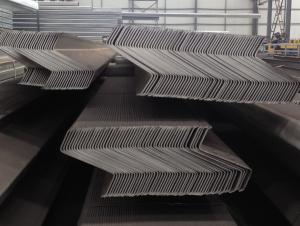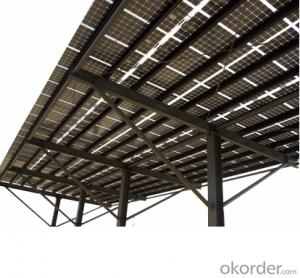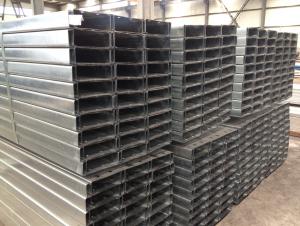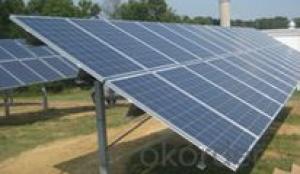Aluminum Solar Frame for Solar Pv Modules
- Loading Port:
- China Main Port
- Payment Terms:
- TT OR LC
- Min Order Qty:
- -
- Supply Capability:
- -
OKorder Service Pledge
OKorder Financial Service
You Might Also Like
Aluminum Solar Panel Frame | |
A).Products description: | |
Material | Aluminum alloy 6063 T5 |
Surface treatment | Mill finish,anodize,Powder Coating,electrophoresis… |
Fabrications | Precise cutting, drilling, punching,tapping and so on. |
Certification: | ISO:9001-2008 |
Frame section Size: |
30mm*35mm , 35mm*35mm , 35mm*40mm , 30mm*46mm , 35mm*45mm , 35mm*50mm etc. |
Colors | Silver,black,white..... |
B).Features: | |
Section size | (1).35*35 suitable for 80-180w solar modules (2).40*35 suitable for 30-120w solar modules (3).50*35 suitable for 160-220w solar modules (4).Many more other sizes such as: 25*35,30*35,37*40,46*30 etc, all the sizes according to customer's requierments. |
Dimension of Frame: | Common specifications: L(mm)* W(mm)*H(mm) 1660*996*40/45/50; 1665*1001*40/45/50 1630*960*40/45/50 Or as per customized requirement.
PS: other common Specifications Maxpower(W) Cells Type Size ( L * W * H ) 280W 156*156P/M 6*12PCS 1956*992*50MM 260W 156*156P/M 6*12PCS 1956*992*50MM 240W 156*156P/M 6*10PCS 1650*992*50MM 220W 156*156P/M 6*10PCS 1650*992*50MM 200W 156*156P/M 6*9PCS 1476*992*45MM 180W 156*156P/M 6*8PCS 1650*836*50MM 150W 156*156P/M 4*9PCS 1476*680*35MM 140W 156*156P/M 4*9PCS 1476*680*35MM 250W 125*125P/M 8*12PCS 1600*1050*40MM 245W 125*125P/M 8*12PCS 1600*1050*40MM 195W 125*125P/M 8*10PCS 1340*1050*40MM (for more kindly see below).............. |
C).Type: | (1) 90°-Angle : fix with screws (2) 45° -Angle : fix with Corner Brace |
D). Atavantage of our products | (1). Quality-assured products, fully accredited by ISO9001: 2008; (2) accuracy up to 0.02mm; |
- Q: Can a solar mounting system be used in areas with limited access to electric vehicle charging infrastructure?
- Yes, a solar mounting system can be used in areas with limited access to electric vehicle charging infrastructure. Solar mounting systems generate electricity from sunlight, which can be used to charge electric vehicles. This allows for independent and sustainable charging options in areas where traditional charging infrastructure is not readily available.
- Q: Can solar mounting systems be installed on buildings with architectural features or historical significance?
- Yes, solar mounting systems can be installed on buildings with architectural features or historical significance. However, it is important to ensure that the installation process is done in a way that preserves the integrity and aesthetics of the structure. This may involve careful planning, coordination with architects and preservation experts, and the use of specially designed mounting systems that are discreet and blend in with the building's design.
- Q: Are there any specific requirements for installing a solar mounting system on an asphalt roof?
- Yes, there are specific requirements for installing a solar mounting system on an asphalt roof. Some of these requirements include ensuring that the roof is in good condition and can support the weight of the solar panels, proper sealing and flashing to prevent leaks or damage to the roof, and compliance with local building codes and regulations. It is also important to consider the angle and orientation of the panels for optimal sunlight exposure. Consulting with a professional solar installer is recommended to ensure a safe and efficient installation.
- Q: What is the expected efficiency loss over time for a solar mounting system?
- The expected efficiency loss over time for a solar mounting system can vary depending on various factors such as the quality and maintenance of the system, environmental conditions, and technological advancements. However, it is generally expected that solar mounting systems experience a gradual decrease in efficiency over their lifespan due to factors like dust accumulation, aging of materials, and wear and tear. Regular cleaning, maintenance, and upgrades can help minimize this efficiency loss and extend the lifespan of the system.
- Q: Can a solar mounting system be used on any type of roof?
- No, a solar mounting system cannot be used on any type of roof. The suitability of a solar mounting system depends on the specific characteristics and structure of the roof, such as its material, slope, and load-bearing capacity. Different mounting systems are designed to accommodate different roof types, so it is essential to assess the compatibility and consult with professionals before installing a solar system.
- Q: Can a solar mounting system be used with solar battery storage systems?
- Yes, a solar mounting system can be used with solar battery storage systems. The solar mounting system provides the structure and support for the solar panels, while the battery storage system stores excess energy generated by the panels for later use. The two systems work together to maximize the efficiency and effectiveness of solar energy utilization.
- Q: Can solar mounting systems be installed on agricultural land?
- Yes, solar mounting systems can be installed on agricultural land. In fact, it is becoming increasingly common to see solar panels installed on farmland as it provides a dual use of the land, allowing farmers to generate clean energy while continuing their agricultural activities. This practice is known as agrivoltaics or solar farming and it helps in maximizing land usage and diversifying income sources for farmers.
- Q: Are there any specific requirements for installing solar mounting systems in earthquake-prone areas?
- Yes, there are specific requirements for installing solar mounting systems in earthquake-prone areas. These requirements typically include using advanced seismic analysis and engineering techniques to ensure the mounting structures can withstand the expected level of earthquake activity. Additionally, the use of robust and flexible mounting systems, such as those with adjustable angles and reinforced foundations, is recommended to improve the system's resilience to seismic events. Local building codes and regulations may also provide specific guidelines for installing solar mounting systems in earthquake-prone areas that need to be followed.
- Q: Can solar mounting systems be installed on buildings with limited roof space?
- Yes, solar mounting systems can be installed on buildings with limited roof space. There are various types of mounting systems, such as flush mounts or ballasted systems, that can be used to maximize the available roof space for solar panel installation. Additionally, innovative designs like solar carports or ground-mounted systems can be utilized if roof space is insufficient.
- Q: Are there any specific considerations for installing a solar mounting system in a seismic zone?
- Yes, there are specific considerations for installing a solar mounting system in a seismic zone. The system needs to be designed and engineered to withstand the potential ground movements and vibrations caused by seismic activity. This includes using stronger and more robust materials, such as thicker steel or aluminum, reinforced foundations, and additional bracing or anchoring to ensure the stability and integrity of the system during earthquakes. It is also important to comply with local building codes and regulations specific to seismic zones to ensure the safety and durability of the solar mounting system.
Send your message to us
Aluminum Solar Frame for Solar Pv Modules
- Loading Port:
- China Main Port
- Payment Terms:
- TT OR LC
- Min Order Qty:
- -
- Supply Capability:
- -
OKorder Service Pledge
OKorder Financial Service
Similar products
Hot products
Hot Searches
Related keywords
